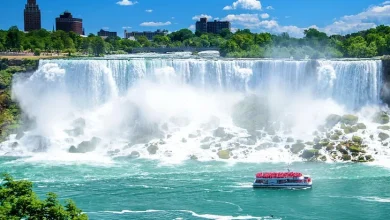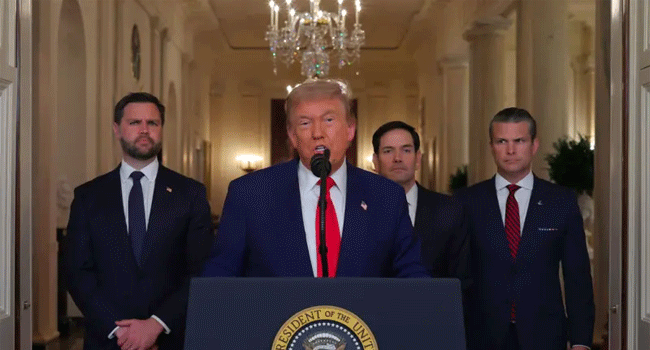Morocco Earthquake: Death toll passes 2,100, Moroccans sleep in the streets for 3rd night following the earthquake
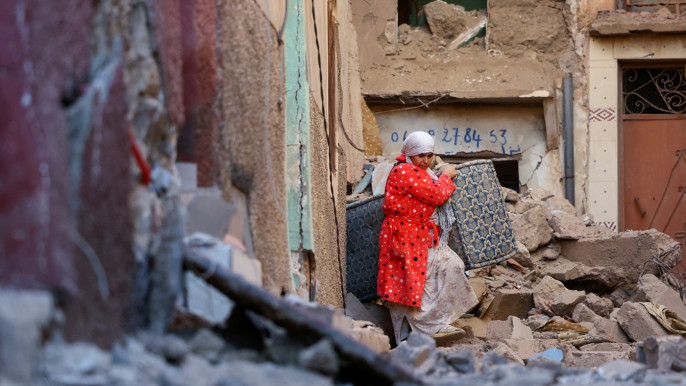
Survivors of Morocco’s deadliest earthquake in more than six decades struggled to find food, water and shelter yesterday as the search for the missing continued in remote villages and the death toll of more than 2,100 seemed likely to rise further.
Many people stayed a third night in the open after the 6.8 magnitude quake hit late on Friday. Relief workers face the challenge of reaching the worst-affected villages in the High Atlas, a rugged mountain range where settlements are often remote and where many houses crumbled.
The death toll climbed to 2,122 with 2,421 people injured.
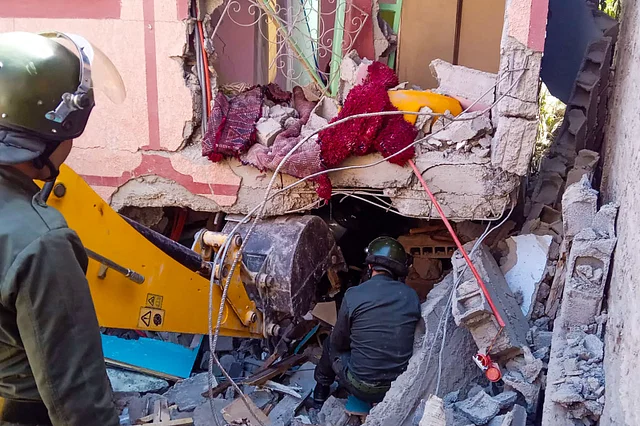
The damage done to Morocco’s cultural heritage became more evident as local media reported the collapse of a historically important 12th-century mosque. The quake also damaged parts of Marrakech old city, a UNESCO World Heritage site.
In Moulay Brahim, a village 40 km (25 miles) south of Marrakech, residents described how they dug the dead from the rubble using their bare hands.
On a hillside overlooking the village, residents buried a 45-year-old woman who had died along with her 18-year-old son, a woman sobbing loudly as the body was lowered into the grave.
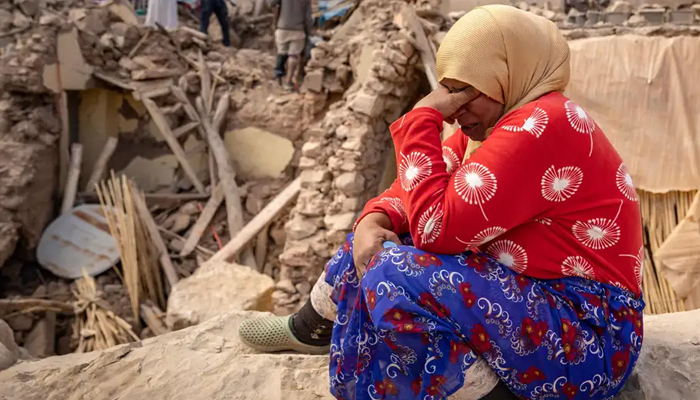
As he retrieved possessions from his damaged home, Hussein Adnaie said he believed people were still buried in the rubble nearby. “They didn’t get the rescue they needed so they died. I rescued my children and I’m trying to get covers for them and anything to wear from the house,” he said.
Yassin Noumghar, 36, complained of shortages of water, food and power, saying he had received little government aid so far.
“We lost everything, we lost the entire house,” he said.
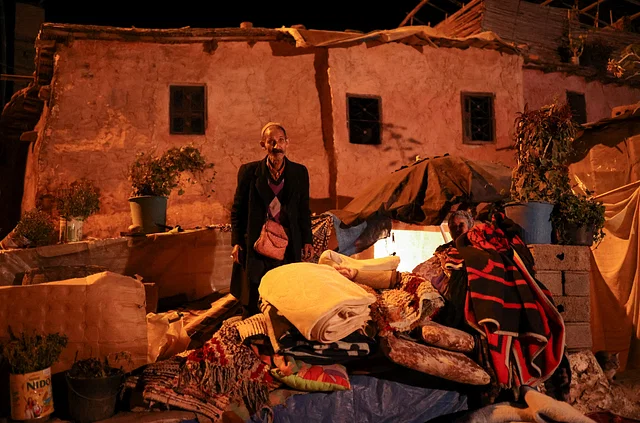
Later, sacks of food were unloaded from a truck which local official Mouhamad al-Hayyan said had been organised by the government and civil society organisations.
Twenty-five bodies had been brought to the village’s small clinic, according to staff.
With many homes built of mud bricks and timber or cement and breeze blocks, structures crumbled easily. It was Morocco’s deadliest quake since 1960 when a tremor was estimated to have killed at least 12,000 people.
In the badly hit village of Amizmiz, residents watched as rescuers used a mechanical digger on a collapsed house.
“They are looking for a man and his son. One of them might still be alive,” said Hassan Halouch, a retired builder.
The team eventually recovered only bodies.
The army, mobilised to help the rescue effort, set up a camp with tents for the homeless.
With most shops damaged or closed, residents struggled to get food and supplies.
“We’re still waiting for tents. We haven’t had anything yet,” said Mohammed Nejjar, a labourer, who was folding his blanket in a makeshift shelter constructed with bits of wood.
“I had a little food offered by one man but that’s all since the earthquake. You can’t see a single shop open here and people are frightened to go inside in case the roof falls down.”
The government said on Saturday it was taking urgent measures to address the disaster including reinforcing search and rescue teams, providing drinking water and distributing food, tents and blankets.
FOREIGN AID
Spain said 56 officers and four sniffer dogs had arrived in Morocco, while a second team of 30 people and 4 dogs was heading there. Britain said it was deploying 60 search and rescue specialists and 4 dogs, as well as a four person medical assessment team. Qatar also said its search and rescue team had departed for Morocco.
US President Joe Biden expressed his “sadness about the loss of life and devastation” caused by the quake. “We stand ready to provide any necessary assistance to the Moroccan people,” he said at a news conference in Hanoi, Vietnam.
The United States dispatched a small team of disaster experts to Morocco to assess the situation. A US official said they arrived there yesterday.
France said it stood ready to help and was awaiting a formal request from Morocco. “France is ready to offer its aid to Morocco if Morocco decides it is useful,” President Emmanuel Macron said at the G20 Summit in New Delhi.
Other countries offering assistance include Turkey, where earthquakes in February killed more than 50,000 people. By yesterday, the Turkish team had not yet departed.
“The next 2-3 days will be critical for finding people trapped under the rubble,” Caroline Holt, global director of operations for the International Federation of Red Cross and Red Crescent Societies (IFRC), told Reuters.
She said the international aid system has been waiting for an invitation from Morocco to assist, adding this was not necessarily unusual as the government assesses needs.
A spokesperson for Morocco’s government did not immediately respond to Reuters phone calls seeking comment.
The World Health Organisation said more than 300,000 people have been affected by the disaster.
Pope Francis offered prayers and solidarity for the victims.
Morocco has declared three days of mourning and King Mohammed VI called for prayers for the dead to be held at mosques across the country.
The quake’s epicentre was 72 km (45 miles) southwest of Marrakech, a city beloved of Moroccans and foreign tourists for its medieval mosques, palaces and seminaries richly adorned with vivid mosaic tiling amid a labyrinth of rose-hued alleyways.
People in Morocco slept in the streets of Marrakech for a third straight night as soldiers and international aid teams in trucks and helicopters began to fan into remote mountain towns hit hardest by a historic earthquake.
The disaster killed more than 2,100 people — a number that is expected to rise — and the United Nations estimated that 300,000 people were affected by Friday night’s magnitude 6.8 quake.
Amid offers from several countries, including the United States and France, Moroccan officials said Sunday that they are accepting international aid from just four countries: Spain, Qatar, Britain and the United Arab Emirates.
“The Moroccan authorities have carefully assessed the needs on the ground, bearing in mind that a lack of coordination in such cases would be counterproductive,” the Interior Ministry said in a statement.
While some foreign search-and-rescue teams arrived on Sunday as an aftershock rattled Moroccans already in mourning and shock, other aid teams poised to deploy grew frustrated waiting for the government to officially request assistance.
“We know there is a great urgency to save people and dig under the remains of buildings,” said Arnaud Fraisse, founder of Rescuers Without Borders, who had a team stuck in Paris waiting for the green light. “There are people dying under the rubble, and we cannot do anything to save them.”
Rescue workers search for survivors in a collapsed house in Moulay Brahim, Al Haouz province, on 9 September 2023, after an earthquake.AFP
Help was slow to arrive in Amizmiz, where a whole chunk of the town of orange and red sandstone brick homes carved into a mountainside appeared to be missing. A mosque’s minaret had collapsed.
“It’s a catastrophe,’’ said villager Salah Ancheu, 28. “We don’t know what the future is. The aid remains insufficient.”
Residents swept rubble off the main road into town and people cheered when trucks full of soldiers arrived. But they pleaded for more help.
“There aren’t ambulances, there aren’t police, at least for right now,” Ancheu said, speaking about many parts of the region on Sunday morning.
Those left homeless — or fearing more aftershocks — slept outside Saturday, in the streets of the ancient city of Marrakech or under makeshift canopies in hard-hit Atlas Mountain towns like Moulay Brahim. Both there and in Amizmiz, residents worried most about the damage in hard-to-reach communities. The worst destruction was in rural communities that rely on unpaved roads that snake up the mountainous terrain covered by fallen rocks.
Those areas were shaken anew Sunday by a magnitude 3.9 aftershock, according to the US Geological Survey. It wasn’t immediately clear if it caused more damage or casualties, but it was likely strong enough to rattle nerves in areas where damage has left buildings unstable and residents feared aftershocks.
In a region where many build bricks out of mud, Friday’s earthquake toppled buildings not strong enough to withstand such a mighty temblor, trapping people in the rubble and sending others fleeing in terror. A total of 2,122 people were confirmed dead and at least 2,421 others were injured — 1,404 of them critically, the Interior Ministry reported.
Most of the dead — 1,351 — were in the Al Haouz district in the High Atlas Mountains, the ministry said.
Flags were lowered across Morocco, as King Mohammed VI ordered three days of national mourning starting Sunday. The army mobilized search and rescue teams, and the king ordered water, food rations and shelters to be sent to those who lost homes.




